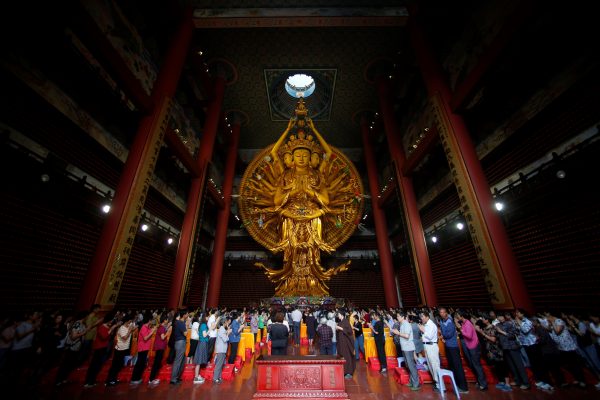In terms of relations with the United States, the damage was immediate, in part because of timing. The campaign against Falun Gong came upon the heels of the 1998 International Religious Freedom Act, which made protection of religion an enforceable plank of American diplomacy.
Over recent years, religion as a diplomatic sticking point has somewhat faded in importance. Falun Gong itself has largely receded from public view, while the issues of religion, and of human rights more generally, have been significantly overshadowed by the pressing need to secure China’s cooperation on other economic and security fronts. But China’s security concerns are now caught up with new concerns about religion, notably but not exclusively Islamic extremism.
Since its founding, the People’s Republic of China has promulgated numerous laws clarifying the place of religion in society. Perhaps contrary to expectations, and certainly to the experience of the Soviet Union, the PRC has never expressed opposition to religion in principle. Even before coming to power in 1949, Mao Zedong and his cohort looked upon the Soviet experience of violent confrontation with the Russian Orthodox Church as a cautionary tale, and instructed rural cadres not to risk incurring the wrath of peasants by destroying temples and idols.
The PRC’s 1954 constitution affirmed the new government’s commitment to ‘freedom of belief’ and its policy towards Buddhists, Catholics and Muslims showed that the Chinese Communist Party saw not only danger in an overly aggressive approach to religion, but also cultural and other reasons to allow religion to survive under state auspices.
On 8 September 2016, the State Council released a draft of the new ‘Regulations on Religious Affairs’, which was actually a revision of the 2005 law of the same name. When the two laws are placed side by side, the consistent trends — and the new directions — to China’s religious policy quickly emerge.
Compared to 2005, the 2016 law increases scrutiny of imported religious materials, particularly of religious news websites, and makes new mention of religious schools, which are to be regulated in the same manner as other religious institutions. There is also fresh attention to financial matters, including banning registered religious groups engaging in certain types of investment and commercial activity. Religious charities and non-profit organisations — already subject to a new set of regulations earlier this year — were also mentioned for the first time in the 2016 law.
The new law also sets out more detailed legislation of various sorts of financial fraud, non-payment of taxes, or compelling donations, particularly as committed outside the officially bounded set of religious sites and personnel. Foreign donations come under special scrutiny and now must be reported to the local Department of Religious Affairs.
Not surprisingly, there is in the revised law great concern regarding religious extremism and the use of religion as a voice for ethnic separatism. The only specific mention of Islam is a provision for the hajj — an annual Islamic pilgrimage to Mecca — to remain in the hands of the state Muslim organisation. There is also ongoing concern regarding the infiltration of religious proselytisation into national education by a number of groups.
Equally striking are the areas that have not changed. Like its predecessors, the 2016 draft law begins by affirming the freedom of Chinese citizens to believe — or not — in religion and to participate in religious activities (within closely guarded boundaries). According to the law itself, the purpose of state regulation is precisely to protect ‘legitimate’ religious activity, while making sure that religion does not fall into the hands of ethnic separatists or become a threat to national unity.
All of these concepts are, of course, highly elastic, and can be manipulated as simply as labelling a group like Falun Gong as a ‘cult’ rather than a religion. But there is also a danger in outright dismissing China’s particular approach to religion, especially when countries like France and Britain are themselves coming to terms with Islamic extremism at home and preparing to follow the United States and make religious freedom legally enforceable through international policy.
Thomas DuBois is an Associate Professor and Senior Research Fellow in Chinese Studies at the College of Asia and the Pacific, The Australian National University.


It is interesting that Thomas DuBois opened with the Chinese government’s campaign against Falun Gong, because earlier this year, the Chinese government made some unusual gestures that appear aimed at addressing the persecution.
At the national conference on religion in April, Xi Jinping employed lingo that appeared conciliatory towards religion. Curiously, Xi’s speech was made near April 25, or the anniversary of the so-called Zhongnanhai incident. (see http://www.theepochtimes.com/n3/2058843-xi-jinping-hints-at-shifting-regime-stance-towards-falun-gong/)
Then near the anniversary of the actual persecution itself, the Central Political and Legal Affairs Commission held a meeting in Changchun—the birthplace of Falun Gong and the practice’s founder—where the issue of correcting “miscarriages of justice in history” was raised. (see: http://www.theepochtimes.com/n3/2120952-near-anniversary-of-falun-gongs-persecution-chinese-regimes-security-agency-discusses-righting-wrongs/)
The month of September has seen the Chinese government react more unusually towards Falun Gong.
Minghui.org, a clearinghouse of information about the persecution that is run by Falun Gong practitioners, learned that a classified CCP General Office document issued to local governments countrywide wrote that practitioners and their family members had been “treated unjustly” (“不公的对待”) for the past 17 years—possibly the first time the CCP has officially acknowledged that injustice has been done towards Falun Gong. (see: http://www.minghui.org/mh/articles/2016/9/2/per centE6per cent9Cper centBAper centE5per centAFper cent86per centE6per cent96per cent87per centE4per centBBper centB6per centE5per cent86per cent8Dper centE8per centAFper cent81per centE4per centB8per centADper centE5per cent85per centB1per centE6per cent9Cper centACper centE8per centB4per centA8-333901.html)
Then on Sept. 13, human rights lawyers representing a high-profile Falun Gong couple managed to make a not guilty plea and defend the core teachings of Falun Gong (真善忍) in a Tianjin court—and weren’t arrested for their politically sensitive defense. (see: http://www.theepochtimes.com/n3/2156752-chinese-human-rights-lawyers-defend-teachings-practitioners-of-falun-gong-in-court/)
The winds, it appears, could be changing on the Falun Gong issue.